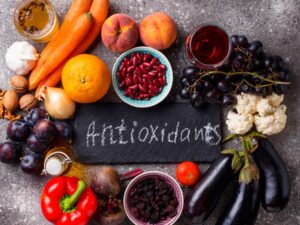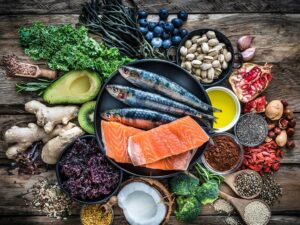Getting More Antioxidants
A lot goes in to eating a “healthy diet.” You need good meat that’s grown without the assistance of steroids and antibiotics. Eggs from chickens that get to eat bugs and grass. Water that doesn’t have enough germs and chemicals to make you sick. Vegetables that aren’t genetically modified. And fruit that’s not covered in pesticides. You pretty much need to act like a modern-day hunter gatherer to find these foods.
As if that wasn’t enough, you also have to consider whether you’re getting enough of the components of food such as protein, fatty acids (mainly omega-3s), vitamins and minerals. Then there are those components we don’t think about as often such as phytonutrients and antioxidants.
It can all feel overwhelming and confusing. But at Exercise Inc, we try to eliminate the guess work with our Simple 9© Habits for a Healthy Life.

So, let’s simplify: Antioxidants are essential to a healthy diet because they defend your body from free radical damage. Free radicals are molecules that contain an unpaired electron, which makes them unstable and highly reactive. Free radicals can harm lipids, proteins, and DNA and trigger several human diseases.
If free radicals overwhelm the body’s ability to regulate them, a condition known as oxidative stress occurs. Oxidative stress significantly contributes to all inflammatory diseases (particularly arthritis and lupus), heart diseases, ulcers, and neurological disorders like Alzheimer’s and Parkinson’s.
We naturally produce a small number of free radicals every day. But large amounts of free radicals can come from cigarette smoke, environmental pollutants, radiation, drugs, pesticides, and too much aerobic exercise. That’s right, chronic cardio, running or biking too much, increases oxidative stress. That’s part of the reason we emphasize walking as your best option for physical activity.
Antioxidants defend your body against free radicals because they are stable enough to donate an electron and neutralize them. They terminate the chain reaction of free radicals before they damage vital molecules.
Your body is in a constant battle against aging. That process will accelerate if you are exposed to too many free radicals on a regular basis. Have you ever noticed smokers who look a lot older than they are? You may have noticed the same thing in people who do chronic cardio for years.
Reducing free radicals can slow down the aging process. So can neutralizing free radicals by consuming plenty of antioxidants. The principal antioxidants are vitamin A (beta-carotene), vitamin C, and vitamin E. We also find lots of antioxidant enzymes in real whole foods.
Some of you are already wondering if you should take antioxidants in the form of a pill or powder—don’t. Synthetic antioxidants can actually cause more harm than good. A few years ago scientist learned that beta carotene from carrots slowed the rate of lung cancer growth. But beta carotene given to cancer patients in supplement form accelerated tumor growth.
Real whole foods are the best way to consume antioxidants. In 1992 the National Institute on Aging created an index known as the ORAC score (oxygen radical absorbance capacity), which rates foods based on their antioxidant capacity. Supplement manufacturers immediately started using the score to make strong claims about their products. Ignore those claims.
The important thing about the ORAC score—it’s the best way for the average person to learn which foods have relatively high antioxidant content. The ORAC score of a food is important, but a lot of other factors are important as well, like how much of the compounds you absorb and the freshness of the foods you consume. Let’s look at the best foods for boosting your antioxidant consumption.
Plant Foods High in Antioxidants
Plant foods naturally contain more antioxidants than animal products, but that doesn’t mean animal foods are less important. When it comes to plants, “eating the rainbow” will give you a great spectrum of vitamins, minerals, and antioxidants. It’s also important to be intentional about getting some high antioxidant foods in the mix.
Here are 12 plant-based foods that can boost your antioxidant intake based on the ORAC score:
- Berries
- Coffee
- Dark Chocolate (the darker the better)
- Chia seeds
- Artichokes
- Plums and prunes
- Pistachios
- Pomegranates
- Figs
- Kalamata olives
- Kale
- Green tea
Animal Foods High in Antioxidants
Animal foods contain a lower antioxidant capacity compared to plant foods. But here is a list of animal foods that are high in the trace minerals copper, selenium, iron, manganese, and zinc. These minerals are all crucial pieces of your body’s antioxidant defense system.

- Liver
- Oysters
- Salmon
- Crab
- Lamb
- Beef
- Eggs
- Mussels
- Tuna
- Sardines
Like I said, we don’t often think about eating some of these foods. But we probably should if we want to have a strong defense against sickness, inflammation, autoimmune diseases, and cancer.
Stay Strong,
Bo Railey

